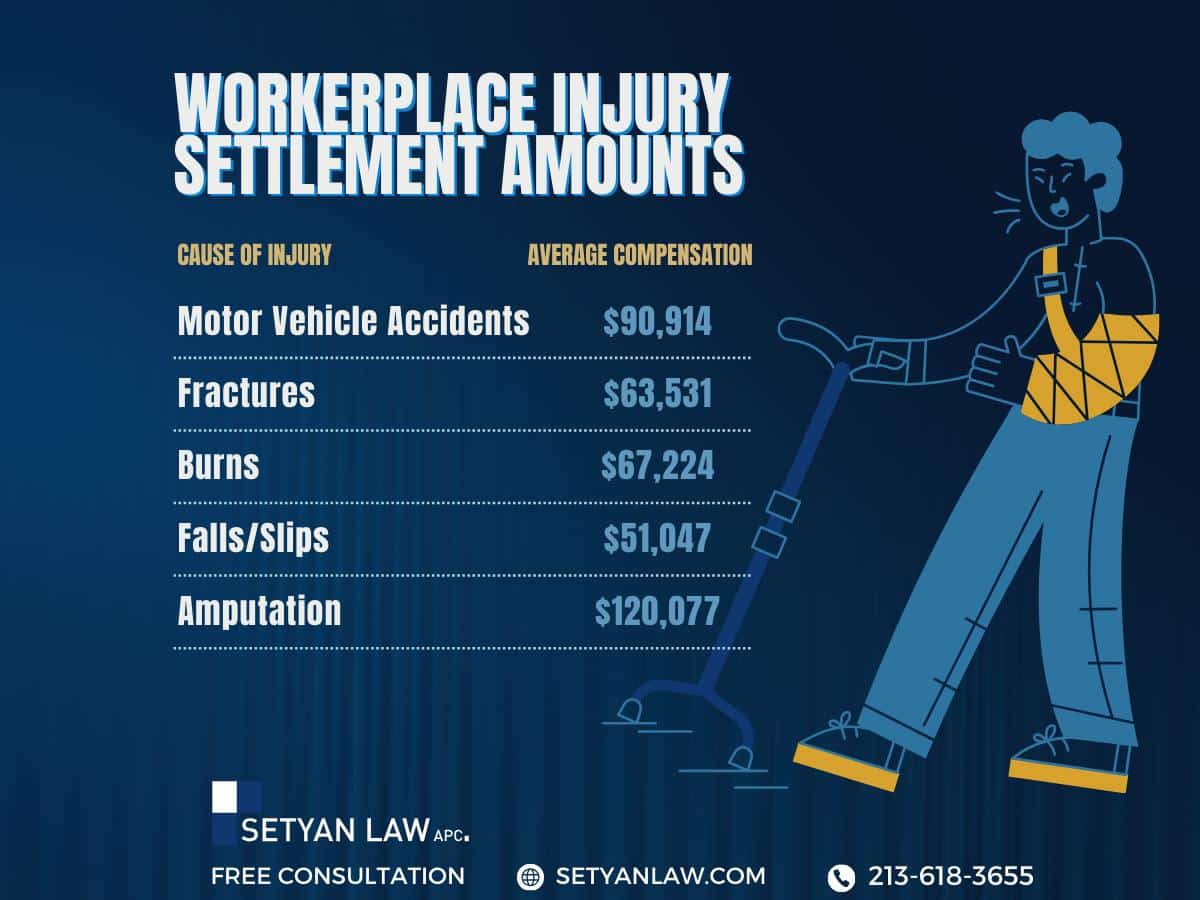Updated October 16, 2025
Job Related Injuries During Breaks: Your California Workers' Comp Rights
Job related injuries don't always happen while you're actively working. Many employees are surprised to discover that injuries sustained during breaks can sometimes qualify for workers' compensation benefits in California. However, the rules governing these situations are often misunderstood.
For many California workers, determining whether an injury during lunch or a rest period is covered becomes a confusing and frustrating experience. Despite being a common occurrence, the line between compensable and non-compensable break-time injuries remains blurry for most employees. In fact, eligibility often depends on several critical factors including where you were, what you were doing, and whether your employer maintained any control during your break time.
This comprehensive guide examines the complex rules surrounding job related injuries that occur during breaks in California. We'll explore the different types of work breaks recognized under state law, explain when workers' compensation typically applies, and provide practical guidance on protecting your rights if you've been injured during a break period.
What Counts as a Break Under California Law
California employers must follow specific break requirements for their non-exempt employees. Understanding these regulations is essential when determining if job related injuries that occur during these periods qualify for workers' compensation benefits.
Meal breaks vs. rest breaks
The state distinguishes between two primary break types, each with distinct rules. Rest breaks are shorter periods intended for employees to rest and recharge. For every four hours worked (or major fraction thereof), employees must receive a 10-minute rest break [1]. A "major fraction" means any work period exceeding two hours [1].
Meal breaks, on the other hand, provide longer periods for employees to eat and take time away from work duties. California law requires employers to provide a 30-minute meal break for employees who work more than five hours in a day [2]. This first meal period must begin before the end of the employee's fifth hour of work [3]. For shifts exceeding 10 hours, employees are entitled to a second 30-minute meal break, which must start before the end of their tenth hour [2].
The distribution of breaks also differs. Rest breaks should, whenever practical, be positioned in the middle of each four-hour work segment [2]. For an eight-hour workday, one rest break typically falls on each side of the meal period [2].
Paid vs. unpaid breaks
One crucial distinction between break types relates to compensation. Rest breaks count as hours worked and must be paid [2]. Employees cannot be required to clock out for these short breaks.
Conversely, meal breaks can be unpaid, but only under specific conditions. To qualify as an unpaid meal break, employers must:
- Relieve employees of all duties
- Relinquish control over employee activities
- Provide reasonable opportunity for uninterrupted 30-minute breaks
- Not impede or discourage employees from taking breaks [2]
Consequently, if an employee must remain "on duty" during a meal period or stay on the employer's premises, that meal break must be paid [4].
On-duty vs. off-duty status
The difference between on-duty and off-duty break status significantly impacts workers' compensation eligibility. For rest breaks, California law prohibits "on-duty" and "on-call" arrangements [5]. During required rest periods, employers must relieve employees of all duties and relinquish control over how they spend their break time [5].
Similarly, meal breaks should generally be off-duty. Nevertheless, "on-duty" meal periods are permitted in limited circumstances where:
- The nature of the work prevents an employee from being relieved of all duty
- The employer and employee have a written agreement allowing for on-the-job paid meal periods
- The employee retains the right to revoke the agreement at any time [2]
Additionally, employers cannot require employees to remain on-call during breaks. As the California Supreme Court clarified, "one cannot square the practice of compelling employees to remain at the ready, tethered by time and policy to particular locations or communications devices, with the requirement to relieve employees of all work duties and employer control during 10-minute rest periods" [5].
Failure to comply with these break requirements can result in significant penalties. For each workday that a meal or rest break is not provided as required, employers must pay one additional hour at the employee's regular rate of pay [1].
Understanding these distinctions becomes particularly important when assessing whether job related injuries during breaks qualify for workers' compensation benefits.
Are Injuries During Breaks Covered by Workers’ Comp?
Determining whether a break-time injury qualifies for workers' compensation in California requires understanding several key principles. The rules aren't always straightforward, yet knowing these guidelines helps workers protect their rights after job related injuries that occur during breaks.
General rule for off-duty injuries
The foundational principle in workers' compensation is that injuries must arise "out of and in the course of employment" to be compensable. For breaks, this typically means that truly off-duty injuries are not covered under what's known as the "going and coming" rule.
Under this principle, activities considered outside the scope of employment—such as commuting to and from work or purely personal activities during a genuine off-duty break—generally fall outside workers' compensation coverage. This applies primarily to:
- Injuries during unpaid meal breaks when completely relieved of duties
- Accidents occurring while leaving company property for personal errands
- Incidents during activities not benefiting the employer
Yet, this isn't an absolute rule. The "personal comfort doctrine" creates important exceptions, recognizing that employees must attend to personal needs like eating, drinking, and resting to maintain their effectiveness at work. Therefore, minor deviations for personal comfort don't necessarily remove workers from the course of employment.
Exceptions to the rule
Several significant exceptions can make break-time injuries compensable, even when technically "off-duty":
First, injuries occurring on employer premises often remain covered, regardless of whether you're clocked in or out. This premises rule acknowledges that employees face workplace hazards even during breaks.
Second, the "reasonable expectation" exception applies when employers expect or encourage certain break-time activities. For instance, if your supervisor routinely asks you to pick up lunch for the team during your break, injuries sustained while doing so may be covered.
Third, injuries during mandatory activities remain compensable. If your employer requires you to stay on-site during breaks or attend a working lunch, you're essentially still "on the clock" for workers' compensation purposes.
Finally, injuries sustained while performing even minor work duties during breaks typically qualify. Answering a work call during lunch or helping a colleague with a work task keeps you within the scope of employment.
The role of employer control
Employer control stands as perhaps the most critical factor determining workers' comp eligibility for break-time injuries. The greater the control exercised over your break activities, the more likely your injury will be covered.
Multiple aspects of control affect eligibility:
- Location restrictions: Requirements to remain on-premises or in specific areas
- Time limitations: Fixed break schedules with strict return times
- Activity constraints: Rules about permitted or prohibited break activities
- Availability requirements: Expectations to remain on-call or responsive
Courts examine these factors holistically. Even subtle forms of employer control can tip the scales toward coverage. For example, if your employer restricts where you can take breaks or expects immediate availability if needed, you remain under employer control despite technically being "off-duty."
The California Supreme Court has emphasized that genuine breaks must relieve employees of all duties and relinquish employer control. Failing this standard means the employee remains within the course of employment—and eligible for workers' compensation if injured.
Understanding these principles helps workers recognize when their break-time injuries might qualify for workers' compensation, ensuring they don't miss out on deserved benefits after job related injuries.
Real-Life Scenarios That Affect Eligibility
Understanding specific scenarios can help you determine if your break-time job related injuries qualify for workers' compensation benefits in California. Real-world examples often clarify these complex rules better than abstract principles alone.
Injury on company premises
Accidents that occur in employer-owned spaces typically remain compensable, even during breaks. Injuries sustained in company parking lots, restrooms, or while you're on the premises for a rest break usually qualify for workers' compensation [6]. This protection extends to company cafeterias and break rooms where slip-and-fall accidents commonly occur [7].
Given these points, if you slip on a spilled drink in your workplace cafeteria or trip on damaged carpeting during your break, you'll likely have a valid claim [8]. This coverage applies because California law recognizes that remaining on company premises during breaks is fundamentally beneficial to employers, as it saves time and keeps employees accessible [8].
Running errands for employer
Job related injuries that happen while performing work-related tasks during breaks typically qualify for benefits, regardless of your technical "off-the-clock" status. First, if your supervisor asks you to pick up office supplies or make a bank deposit during your lunch break, injuries sustained during these errands generally remain covered [9].
To illustrate, consider a scenario where you're involved in a car accident while dropping off company mail or picking up items for a team event as requested by HR [9]. The critical factor here is that the activity must be directly related to your work duties and explicitly or implicitly assigned by your employer [9]. Under these circumstances, the law recognizes you're still acting within the scope of your employment.
Injury during personal activity
Conversely, injuries during purely personal activities typically fall outside workers' compensation coverage. If you leave work premises to visit a restaurant or park during lunch and get injured, your claim will likely face challenges [7]. Similarly, injuries sustained during personal appointments scheduled during break times generally don't qualify [7].
Furthermore, personal detours can invalidate otherwise covered activities. For instance, if you're running a work-related errand but stop to buy personal groceries and get hurt during that deviation, that specific segment may not be compensable [9]. The law distinguishes between activities that benefit your employer versus those exclusively serving personal interests.
Injury during a working lunch
Job related injuries occurring during business-related meals often remain eligible for compensation. If you're attending a mandatory team lunch, meeting with clients, or participating in any work-related discussion over a meal, injuries sustained during these activities typically qualify [10].
Equally important, employer-sponsored events or lunch meetings generally remain within the scope of employment [11]. The fundamental question is whether your employer benefited from your activity – if they did, your injury has a stronger connection to your employment [11]. As a result, a slip while delivering a presentation during lunch would likely be compensable, while an injury during a personal lunch outing would not.
Key Factors That Determine Eligibility
When evaluating job related injuries that occur during breaks, California workers' compensation judges look at several specific factors to determine claim eligibility. Understanding these crucial elements can help you assess the strength of your potential claim.
Where the injury occurred
Location plays a pivotal role in determining eligibility. Injuries that happen on company property—including break rooms, cafeterias, and restrooms—typically qualify for workers' compensation, even during breaks. This protection extends to:
- Employer-owned parking lots and walkways
- Company-maintained outdoor areas
- Designated break spaces on premises
Moreover, California courts consider whether the employer had control over the area where the injury occurred. As highlighted in multiple cases, this control factor often becomes decisive in determining compensability [12]. Indeed, injuries sustained on public sidewalks adjacent to workplaces might not qualify if the employer doesn't maintain that space.
What you were doing at the time
Your activity when injured substantially impacts eligibility. Workers' compensation typically covers injuries during activities that have a connection to employment duties. In essence, if you were running a work-related errand during lunch or completing tasks that benefit your employer, your claim stands a better chance.
Conversely, injuries during purely personal activities—like shopping for personal items or engaging in recreational activities unrelated to work—generally face greater scrutiny [13]. The nature of your activity establishes whether you remained within the "course and scope" of employment despite being on break.
Whether the employer benefited
Another significant consideration involves determining if your activity provided any benefit to your employer. Under these circumstances, California courts often find injuries compensable when the employer gains some advantage from your break-time activities.
For instance, if you stayed on-site during your break (saving time and remaining accessible), attended a working lunch, or maintained physical fitness for a physically demanding job, these factors can strengthen your claim [14]. Primarily, judges examine whether the activity served any business purpose, regardless of whether you were technically "off the clock."
Whether the break was truly off-duty
The distinction between on-duty and off-duty breaks profoundly affects eligibility. A truly off-duty break means you're relieved of all work responsibilities and employer control. Although paid status during breaks often indicates continued employment status [4], additional considerations include:
Whether you remained subject to employer rules
If you could be called back to work
Whether you were performing any work functions
If the employer dictated how you spent your break time
Notably, even scheduled breaks might not be considered fully "off-duty" if your employer maintains significant control over your activities or location during that time [15].
What to Do If You’re Injured During a Break
Taking immediate action after job related injuries during breaks can significantly impact your claim's success. Following these specific steps helps preserve your rights under California's workers' compensation system.
Report the injury immediately
First, notify your supervisor or employer about your injury as soon as possible. California law requires reporting workplace injuries within 30 days, though reporting immediately strengthens your claim. Even if the injury seems minor initially, prompt reporting establishes an official record and prevents employers from claiming they weren't informed.
Document the incident and location
Next, create a detailed record of your injury circumstances. Note exactly where you were when injured, what you were doing, and whether any workplace conditions contributed to the accident. Take photos of the injury location and any hazardous conditions. Additionally, collect contact information from anyone who witnessed the incident, as their testimony may prove valuable later.
Seek medical attention
Subsequently, get proper medical care without delay. Even seemingly minor injuries can develop into serious conditions. Your medical records will serve as crucial evidence linking your injury to workplace conditions. Be completely honest with healthcare providers about how and where your injury occurred.
Consult a workers' comp attorney
Ultimately, break-time injuries often face greater scrutiny from employers and insurance companies. A specialized workers' compensation attorney can evaluate your case's specific circumstances, help gather necessary evidence, and navigate complex filing requirements. Most importantly, legal representation typically increases your chances of receiving fair compensation, especially for injuries occurring during ambiguous break periods.
Conclusion
Understanding your rights regarding job related injuries during breaks remains essential for every California worker. Workers' compensation cases involving break-time injuries often fall into gray areas that require careful evaluation. Though the general rule excludes truly off-duty activities, numerous exceptions exist that might still qualify your injury for benefits.
Location matters significantly in these cases. Injuries occurring on company premises typically remain compensable regardless of whether you're officially on break. Additionally, your specific activity at the time of injury plays a crucial role – actions benefiting your employer or performed at their request usually strengthen your claim.
Employer control stands as the most decisive factor in determining eligibility. Any restrictions on where you can go, what you can do, or expectations to remain available during breaks effectively keep you within the scope of employment for compensation purposes.
Break-time injury claims face greater scrutiny from insurance companies and employers. Therefore, prompt reporting, thorough documentation, and immediate medical attention become essential steps after any workplace injury. Workers unsure about their eligibility should consult a workers' compensation attorney who can assess their specific situation.
California's workers' compensation system aims to protect employees when job related injuries occur. Armed with knowledge about your rights during breaks, you can better navigate the claims process and receive the benefits you deserve. Remember – the key question isn't simply whether you were on break, but whether you remained within the course and scope of your employment when the injury occurred.
Call Setyan Law at (213)-618-3655 for a consultation.






